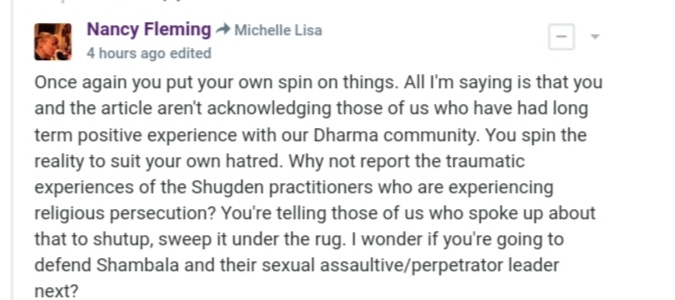Spiritual narcissism
Many survivors report in their testimonies (for example here) that when they first attended an NKT centre they were told that they must have ‘imprints’ from a previous life or ‘fortunate’ karma to have discovered their version of the dharma, and therefore are special. This could be considered similar to love-bombing and flattery employed by those with narcissistic personality traits. Survivors report pre-existing low self-esteem and the enjoyment of this flattery, however report that it impacted on their decision making.
Students are repeatedly told that they are extremely fortunate through the teachings, which makes it appear that this version of the dharma and the organisation is therefore extremely precious and valuable ‘nectar’ which could help you reach enlightenment within 3 years 3 months and 3 days. Anders (2019b) states that so called Western Buddhist groups have suggested that enlightenment can be ‘achieved at maximum speed, immediately within one lifetime at least, and ignoring the otherwise common gradual training of complex methods being conveyed in Vajrayāna. Concepts of superiority and having been the chosen one were created on this ground, thereby manipulating the feelings in those affected‘.
Members are indoctrinated to believe they are becoming more compassionate and wise when the opposite might be occurring. This is very difficult to understand when you are still part of the group as the feelings of awe and fervor (infatuation) lead you to believe that Kelsang Gyatso really is a special being who holds the ultimate truth.
‘grandiose goals of the group—get everyone on earth to meditate so there will be peace, or end world hunger—are not met because the group’s energies and resources are constantly directed toward the actual goal of the group, which is the aggrandizement of the leader‘.
Shaw (2014)
During my time at Nagarjuna KMC I heard many people talk as if outsiders were inferior, stupid, worldly, mundane, and ignorant. I believe that the management have indoctrinated people to believe this via the teachings and their behaviours. This was particularly strong when speaking about former members, who were viewed as failures who had been seduced by ‘worldy’ happiness.
Hypocrisy
‘In reviewing teachers, ensuring that their actions correspond with what they teach is a core factor, and it is said the actions of sages are refined, or differentiated, like barley flour. Corrupt Dharma, however, presents as cruel behaviour, covert objectives, lack of transparency and a double bind of authorities and their entourages’.
Anders (2019b)
How can you practice reducing your attachment when you are engulfed in a cultic group?
Long term members of cultic groups become very attached to their guru, the teachings and the group. Therefore, whilst members believe they are contemplating non-attachment, they are actually practicing fusion with the guru, teachings and group. Being in a state of fervor (infatuation) makes people hypersensitive to criticism of the guru, teachings and group.
The teachings speak about how to practice reducing your attachment to your reputation for example. However, NKT members are known to become very defensive about the NKT when challenged. They are put in an impossible position. How can they practice reducing their attachment to their reputation whilst under the spell of fervor and emotional contagion, which actually rewires their brain to be hypersensitive to criticism?
‘The adult traumatizing narcissist is obsessed with maintaining a rigid sense of omnipotent superiority and perfection—of infallibility, self-sufficiency and entitlement—to the extent that she establishes an intensely defended conviction of righteousness and justification’
Shaw (2014)
Attachment to reputation
The continuation of the NKT depends on its reputation. This is why senior NKT threaten former members with harm should they write testimonies. They threaten to ruin the reputation of former members and therefore their livelihoods, in order to avoid their own being threatened:


How can you have compassion for all living beings if you have a Messiah complex?
Neil Elliot’s (senior teacher) guide for teachers states ‘Our task is only to preserve the blessings of Gesh-la in this world, and to spread his pure doctrine to every country’. Therefore, if someone opposes the NKT, how can a teacher or long term member truly have compassion for them if they are interfering with their mission? How can compassion for members come first if expansion is the main priority? According to Anders (2019) ‘quality of care has vanished at the expense of the quantity of centers considered as status symbols‘.
How can you practice reducing attachment whilst grasping at virtuous thoughts and images?
The NKT believe you should be aiming to be happy all the time by holding virtuous thoughts in your concentration at all times. This is not practicing non-attachment. Non-attachment would be to consider sadness, anger, fear as equal to ‘happiness’. Teachings suggest that you should practice clinging to certain ‘minds’ over others. You are practicing thought and emotional control, and spiritual bypassing of emotional pain. This is not reducing attachment to desirous ‘objects’. This is just deciding that certain thoughts are more desirable than others and grasping at them instead. Many believe the NKT has a pathological view of happiness.
‘longing for enlightenment, in the sense of quick relief from suffering rather than through a process of taking individual responsibility and of training, appears to contribute to denying one’s own unconscious aspects, those of the master as well as the resulting group dynamics.’
Anders (2019b)
How can we practice contemplating that ‘we cannot blame others for our suffering’ when we are being indoctrinated to have a persecution complex?
NKT teachings state that:
- We can’t blame others for our suffering
- Abuse exists only as a perception in our mind
- We experience what we perceive as abuse due to our past actions and karma ripening
- That someone you perceive as your abuser is actually your teacher or kind mother
- That you should practice compassion for a person who abused you, remembering that they do so because of their ‘delusions’
- That there is no such thing as righteous anger
However, members of cultic groups are indoctrinated to believe that outsiders persecute them. The NKT leadership have indoctrinated members to believe that the Dalai Lama has abused them by trying to limit their religious freedom. They were instructed to shout at the Dalai Lama during protests:

This contradicts all their own teachings. They believe this has traumatised Shugden practitioners, even though they do not believe trauma exists. Teachings state that you should be able to transform any suffering into the path to enlightenment, and yet, an NKT teacher replies to me in a public forum with the following:

Current members tend to believe that any suffering perceived by former members due to their involvement with the NKT is entirely due to their own karma, whilst the suffering of Shugden practitioners is inflicted upon them by the Dalai Lama. According to the teachings the Shugden practitioners collective karma would be the cause of any of their own (perceived) abuse. Under the influence of fervor and authority, NKT practitioners do not spot these contradictions.
Misogynists, narcissists and abusers as teachers of ‘wisdom and compassion’ and ‘love without pain’
The NKT do not have safeguarding procedures and despite many complaints about abusive teachers they continue to allow them to teach. In my opinion this is because they are simply desperate for teachers, and particularly value young, attractive and confident ones, as they believe they need to attract more young people. The NKT have an internal rule that a teacher will not be allowed to teach again after breaking their vows, but Gen-La Thubten, who had sex with nuns, is allowed to teach again.

The following is an email I personally received from an NKT teacher at Nagarjuna KMC. To cope with the stress of witnessing him take advantage of a vulnerable woman who attended his teachings, he suggests I rejoice in his happiness, and that if I don’t, I am spiritually inadequate. I have now received many private messages from former members who have had similar experiences of spiritual abuse by teachers.
References
Anders, A. I. M. (2019b). Silencing and Oblivion of Psychological Trauma, Its Unconscious Aspects, and Their Impact on the Inflation of Vajrayāna. An Analysis of Cross-Group Dynamics and Recent Developments in Buddhist Groups Based on Qualitative Data. Religions, 10(11), 622
Shaw, D (2014). The Relational System of the Traumatizing Narcissist. International Journal of Cultic Studies, 5, 4-11




